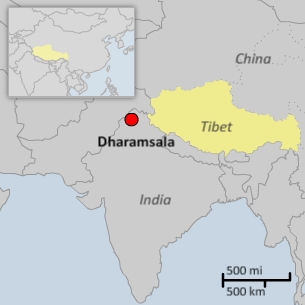




It may be viewed as just a symbolic exercise when Tibetans outside China vote for a government-in-exile this Sunday.
But experts say the election for new members of parliament and a new prime minister will give added push to the Tibetan cause, even though Tibet remains under Beijing's firm control.
The government-in-exile, called the Central Tibetan Administration (CTA), sits in the Indian hill town of Dharamsala, just across the Himalayas from Beijing-ruled Tibet.
Though the exile government remains diplomatically isolated, as no government in the world recognizes it, the election will serve as a powerful reminder that the Tibetans are a people, experts said.
“In terms of political power over territory and the people who live there, of course these elections must be considered symbolic,” said Jamyang Norbu, a Tennessee-based writer and blogger on Tibetan politics.
“But if you look at power not just in the sense of territory and control, but in terms of people’s loyalty, then you have the loyalty of the Tibetans in exile—including the exile government—to the Dalai Lama, which counts for quite a bit.”
The 75-year-old Dalai Lama, who fled to India after a failed 1959 national uprising against Chinese occupation, has been the face and symbol of the Tibetan struggle for almost sixty years.
Norbu noted that about 200,000 Tibetans now live in exile from Tibet. “Their loyalty does matter,” he said.
“So does the loyalty of Tibetans inside Tibet to the Dalai Lama, and hence to his administration—which may not translate immediately into political power, but does in the long term.”
“And that is what makes China nervous,” Norbu said, adding that he sees “a lot of interest from inside Tibet” in the upcoming elections.
A challenge to Chinese rule

Bhuchung Tsering, Vice President for Chinese Outreach of the Washington-based International Campaign for Tibet, agreed, calling next week’s elections a “challenge to Chinese rule in Tibet.”
“Politically, these elections are for an administration that is clearly recognized by Tibetans as a continuation of the [pre-1959] government of Tibet before the Chinese took over.”
Thus, the elections have a “moral and political legitimacy,” Tsering said.
Tibetans even in western provinces of China now look to the CTA as Tibet’s “unified leadership and voice,” he said.
And for Tibetans in exile, the CTA provides “a common strategy in terms of religious and cultural preservation, education, and economic development,” Tsering added.
Tibetans who are now citizens in other countries, for example the United States, can vote without conflict in next week’s polls, Tsering said, because the government-in-exile is not an entity legally recognized by the international community.
Until this happens, “the challenge that I see is for Tibetans to be able to identify themselves both as a Tibetan as well as an American, in the case of Tibetan-Americans,” he said.
A ‘real contest’ this time
Jamyang Norbu pointed to a high level of interest among Tibetans in the upcoming vote, noting that the position of the outgoing prime minister, Samdhong Rinpoche, a Buddhist monk, “was pretty much taken for granted.”
Three candidates—all of them laymen, and only two having previous government experience—are now competing for the job.
“The real contest is this time,” Norbu said, “and I don’t know how it is going to turn out.”
The contest is also being closely scrutinized because the Dalai Lama has expressed his wish to hand over political power to the elected leadership even though he will remain Tibet's spiritual leader.
"In his capacity as the spiritual head he will continue to remain a symbol for Tibetans inside China and elsewhere, and the issue of reincarnation has been kept open," said Jayadeva Ranade, a former senior Indian government official, in a recent commentary.
"He will, additionally, be able to guide interaction with foreign entities and the Chinese authorities. The latter, though progress over the nine rounds [of talks with China] held so far has been slow and incremental, is an important aspect of the Dalai Lama’s agenda," Ranade said.
The Dalai Lama is the 14th in a line of Tibetan spiritual leaders. His predecessors had ruled Tibet virtually unchallenged for centuries before.
Nine rounds of talks have been held between the Chinese and Tibetan delegates on the issue of greater autonomy for Tibet, but there has been no breakthrough.
Amid the vacuum, the exile community hopes to press the Tibetan cause.
“The exile government does have a certain amount of funding, it does have a certain amount of influence, it does control the lives of a lot of the refugees who live in India and elsewhere,” Jamyang Norbu said.
“It’s not huge, but it also has a lot of the negatives of democratic government—you know, people looking for jobs, people looking for privileges, and people looking for appointments,” Norbu said.
“All of these things [exist] alongside the more noble aspects of national identity.”
Reported by Richard Finney.